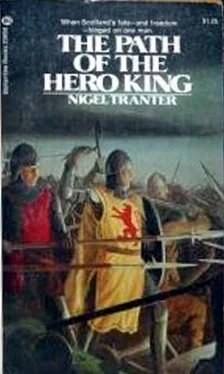The leader could not but perceive the insufficiency of this tactic, and tried an improvement. He himself, and another, plunged forward to clamber over the carcase at the same time, whilst a third moved up close behind and above them, sword swinging. Bruce crouched low, to be under the sweep of the blade, which could not be depressed for fear of flaying the others, and from this position jabbed a vicious thrust that took the first man over in the groin.
The other got further, but while still floundering for a foothold and raising his blade, the Kings swiftly disengaged steel swung sideways and upwards and knocked him staggering, a buffet rather than a sword-stroke, but one which, on that precarious stance, drove its victim over the edge into deep water. As despairingly he sought to gain a grip on stone, to save himself, Bruce had ample time to aim down a shrewd lunge that finished the matter off, and then to turn and put out of his misery the screaming agonised companion.
Two more were already struggling to take the places of this pair, and getting in each others way in the process. These were the easiest victims yet. Panting, the King jabbed and hacked down on them. They fell away without contributing the least advantage to their cause other than the tiring of the defenders arm.
That was six disposed of-seven counting MacDouall himself.
Bruce began to laugh aloud, although something gaspingly.
Now, the second leader gone, the attackers suffered a period of major confusion. They could be no means flee in the face of this one swordsman, even though he might be the King of Scots; but nor could they see a way to overcome him. Moreover more and more of their people were pressing on along the narrow causeway behind, unable to see what went on, in danger of pushing the foremost off into the river. Bruces laughter, jeers and challenges scarcely helped.
As so often is the case in such a situation, all this frustration and lack of direction boiled up in a sudden, furious and disorganised rush forward-which, in other circumstances, by sheer anger and weight of numbers, might well have succeeded in its object; but on that cramped and unsure stance only precipitated further disaster.
Yelling men crowded, jostled and impeded each other, were pushed this way and that, especially from behind and still were unable to get at their quarry, whose flickering, darting steel kept them at the far side of the horseflesh barrier-save for three who fell, pierced, across the horse, two remaining caught there and actually heightening the said barrier. The third was swept away in the current.
Somebody threw a sword, javelin-like. Bruce saw it coming and eluded it with ease, for such weapons make but unwieldy missiles.
But others saw this as a preferable alternative to close-range death, and projectiles began to fly, clubs and daggers as well as swords.
Few were effectively aimed, for of course on such a narrow front the
men ahead got in the way. But Bruce was much preoccupied in dodging
the hurled objects, and more than once all but lost his footing in the
process. Once indeed he was struck, but only a glancing blow that did no damage.
He perceived that this development could change all, and urgently decided to risk a ruse. As another dirk spun past his ear, he produced a high yelp, as of pain, and went down on one knee in the water, steadying himself thus with difficulty against the pull of the river, and leaning forward on his sword as though stricken.
The effect was immediate. There was a great shout of triumph, and the long narrow column surged forward again to the barrier.
Bruce waited until two men were almost across it, and at their most vulnerable, and then leapt up, sword flailing. Unready for this, the pair were disposed of in four slashing strokes. He was able to run through a third, behind them, before the others flung themselves back against the pushing tide of their fellows. One tripped as he did so, probably over a leg of horse or man, and the King managed to disengage his blade and make a wild, weary hack at the floundering man which, more by luck than skill, struck him on the side of the head and knocked him off the causeway on the downstream side where it was deepest. He disappeared.
Gulping for air and dizzy from fatigue, Bruce reckoned that was fourteen slain, or at least put out of action.
His pounding heart sank as more dirks now came whirling through the air at him-for this was the greatest threat, and it was surely only a question of time until one found its mark. And then, above the angry baffled yells in front, he heard other and more distant shouting behind, higher up the hill. Gibbie seemed to have been a long time about bringing aid-though probably that was only an illusion.
The enemy heard the shouting also-and possibly even on the whole welcomed it. They were by no means poltroons, but leaderless, out-manoeuvred, and perceiving no way out of their punishing predicament, they now had the excuse to turn tail and extricate themselves from a thoroughly unprofitable engagement-which they could scarcely have done in the face of just one man. At any rate, as with one accord, those on the causeway turned the other way and began to stream back to dry land again.
Hay and the Islesmen came scrambling down the bank, crying their slogans, with the Carrick men-at-arms a little way behind..
Distinctly unsteady on his legs, Bruce waded back to meet them.
After them, Gibbie, he panted, as his friend came up.
Before they can reform. No leaders now. Keep them running and they will not stop. For long.
How many of them, Sire?
About 200. Less … less fourteen! See-there is a horse to get over…
Somewhat light-headed, the King sat himself down heavily on the same boulder that he had used earlier, while his men surged past. He realised, that there was a long score down his right forearm, dripping blood, but fortunately not deep. In something of a daze he heard the noise of conflict receding, across the burn, the wild eldritch whoops of the Islesmen sounding more like a hunt than a battle. The Gallovidians would, presumably, know that there were only some sixty to oppose them-since their prisoner would have told them-but failure is a progressive business, and lack of direction notably bad for morale. None evidently any longer were preoccupied with victory.
Presently Sir Gilbert returned, with most of the Carrick men and some few prisoners.
They flee, Your Grace-they flee, he announced.
They make no stand. You, Sire? You are well? He perceived the blood on the bare arm.
You are wounded? Dear God-Your Grace is hurt?
Nothing, Gibbie. The merest scratch. Of a lance-point. Thank heaven no others had lances, but their leader. And this small blood he paid for! One MacDouall. From Galloway.
MacDouall? Not Sir Dugald …?
His brother. A start is made in the payment of treachery also.
The saints be praised for that! And that you are yourself again…
The saints-and a spider, Gibbie. A spider, I say!
Chapter Eight
It was not everyone who loved Sir Neil Campbell of Lochawe, a dark, unsmiling, secret man, un forthcoming alone. But Bruce, in these last testing months, had conceived a fondness for him, an appreciation of his unflinching quiet loyalty, as well as his dependability and courage. After all, he of them all was making the most immediate sacrifice in remaining with this small company round the King, the only Highland chief amongst them. His territories in far Argyll were in little danger from the English invaders.
He could go home and live in security and at ease at any time.
Bruce embraced him now, heartily, when Campbell dismounted, despite
the mere score of men he had brought back, as a result of his long absence, to this beautiful wooded basin of Glen Trool amongst the mighty glooming Galloway mountains, however mocking Edward Bruce might look, and disappointed as were the others.
Читать дальше












